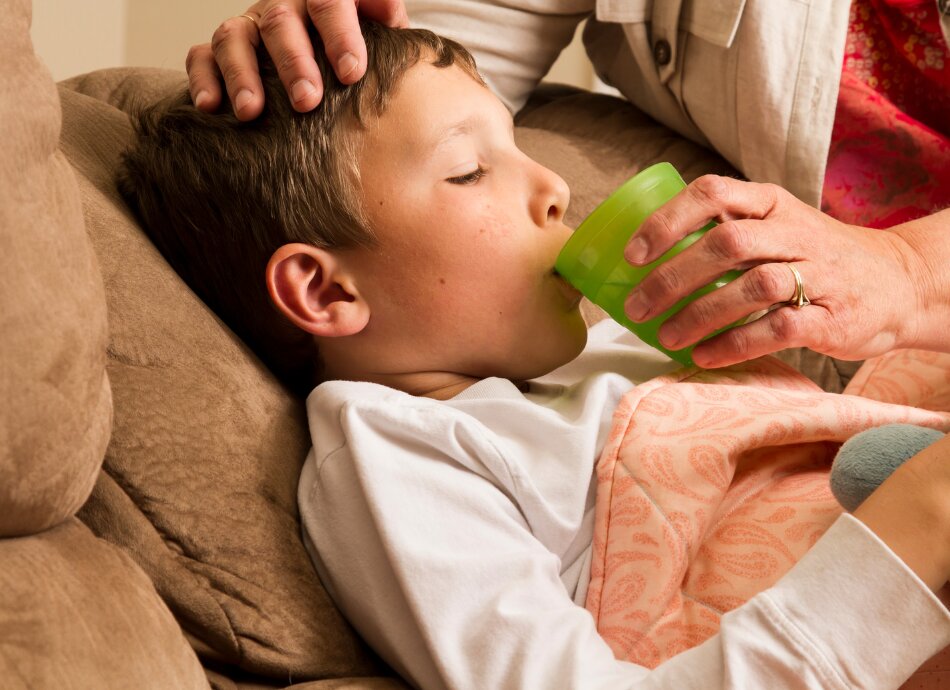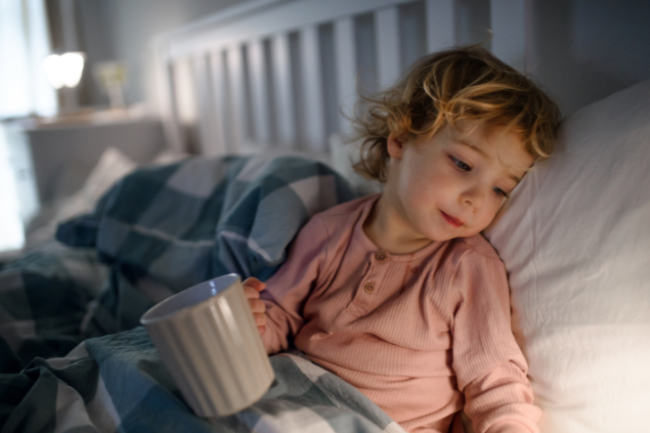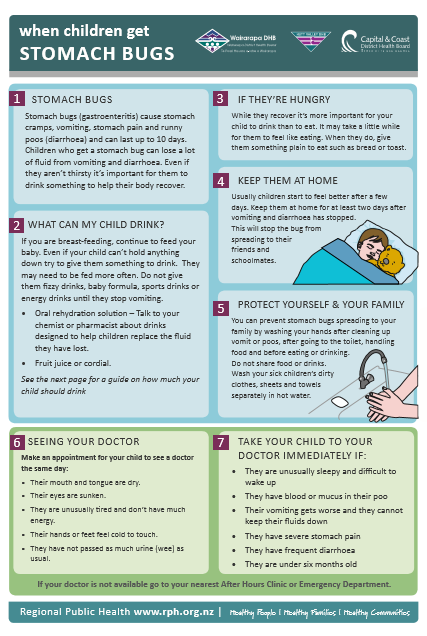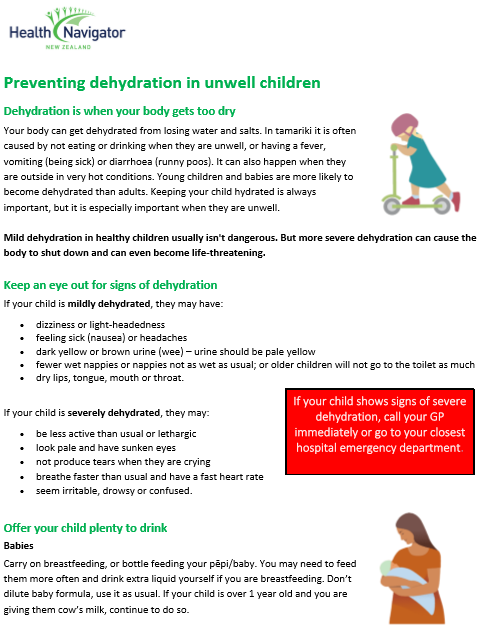Gastroenteritis in children
Key points about gastroenteritis in children
- Gastroenteritis (gastro) is a bowel infection causing diarrhoea (runny poo), and sometimes vomiting.
- It can cause dehydration, especially in pēpi and young tamariki, and make them unwell.
- Watch for signs of dehydration (fewer wet nappies, sunken eyes, unusual sleepiness) and take your child to a healthcare provider urgently if you’re worried.
- If your baby is less than 6 months of age and has vomiting or diarrhoea, see a healthcare provider urgently – pēpi can quickly become dehydrated and unwell.
- The content on this page comes from KidsHealth(external link).

Gastro is a bowel infection which causes runny, watery poo (diarrhoea) and sometimes vomiting (being sick).
Gastro affects all age groups, but is more common, and can be worse, in pēpi and young tamariki.
The vomiting may settle quickly but the diarrhoea often lasts for up to 10 days. This is OK as long as your child is drinking well and seems to be improving.
You can expect your child to get completely better.
Viral
A virus usually causes gastro. Common viruses are rotavirus, norovirus and adenovirus but there are many others. Gastro is very common and tamariki can get it more than once.
Infants younger than 15 weeks of age can have rotavirus immunisation free of charge. This protects against one of the most common causes of gastro. Read more about the rotavirus vaccine.
Bacterial
Sometimes bacteria can cause gastro but this is much less common. This can cause blood in the poo.
How children catch viral gastroenteritis
- The virus is easily spread in homes, daycare, kindergartens and schools.
- A child can catch viral gastro by touching something (such as a cup) that has been in contact with someone who has gastro.
The most common symptoms are:
- feeling sick (nausea)
- diarrhoea (runny, watery poo)
- vomiting (being sick).
Tamariki with gastro may also have:
- a fever
- tummy pains.

Image credit: Canva
When should I get medical help?
|
Always see a healthcare provider urgently if you child has vomiting or diarrhoea and is under 6 months of age. Babies can quickly become dehydrated and unwell. |
Call Healthline on 0800 611 116 or see a healthcare provider urgently if your child:
- is drowsy and difficult to wake
- has a lot of diarrhoea (8 to 10 watery motions in 1 day)
- is vomiting and can’t keep fluids down
- has blood in their poo
- starts vomiting green fluid (bile)
- has severe tummy pain
- shows signs of dehydration
- is unwell and you are worried for any reason.
See a healthcare provider if your child's diarrhoea continues for more than 10 days.
Call 111 within Aotearoa New Zealand for urgent medical help (use the appropriate emergency number in other countries).
Small amounts of fluid often
The main treatment is to keep giving your child fluids. Offer small amounts of fluid often. Keep offering your child fluids even if they are vomiting.
Types of fluids
Continue to give your child what they usually drink. If you're breastfeeding, continue to feed on demand – you may need to feed more often.
You can also give your child the following drinks diluted with water:
- Apple juice – mix 1 part juice to 1 part water.
- Fizzy drinks such as lemonade – add 1 part of warm water to 1 part of fizzy drink (warm water removes the bubbles).
- Cordial – make up to normal drinking strength, then add 1 part of water to 1 part cordial.
- Soup – add 1 part of water to 1 part of soup.
Your healthcare provider may recommend rehydration solutions (such as Gastrolyte or Hydralyte) if your child is dehydrated. You can get these from your pharmacist – follow the instructions on the packet. Read more about electrolyte solutions (also called oral rehydration solution).
Nappy rash
Diarrhoea can cause a nappy rash. After each poo, wash and dry your baby’s bottom well and then put on a protective cream or ointment (such as Vaseline or zinc and castor oil cream).
Eating with gastroenteritis
Your child may refuse food at first – this is OK as long as they take fluids.
Most tamariki will start eating again as they start to get better. It’s fine for them to eat even if diarrhoea continues.
The main treatment is to keep giving your child fluids.
Don’t give your child medicines to reduce diarrhoea. They can be harmful for tamariki.
A healthcare provider may occasionally prescribe a medicine for vomiting. Follow the healthcare provider’s instructions.
Tamariki with viral gastro don’t get better with antibiotics. Antibiotics are used to treat bacterial infections.
The younger the child, the easier it is for them to become dehydrated.
Signs of dehydration:
- Dry mouth and tongue.
- Sunken eyes.
- Cold hands and feet.
- Being drowsy or difficult to wake.
If your child has any of these signs, take them to a healthcare provider urgently.
Reade more about dehydration in children and babies.
Gastro spreads very easily. There are ways to help prevent gastro from spreading.
Thorough hand washing
Handwashing or using hand sanitiser is especially important after going to the toilet, after nappy changing and before handling food. Encourage your child to clean their hands after using the toilet. Read more about hand washing.
Cleaning toilet and bathroom areas
It’s a good idea to thoroughly clean your toilet and bathroom areas.
Washing dirty clothes
Wash your child's dirty clothing straight away.
Avoiding sharing food and drinks
Make sure your child doesn't share food, drinks, cups, drink bottles and utensils with anyone.
Keeping away from others
Keep your child away from others until the vomiting and diarrhoea have stopped. Keep tamariki with diarrhoea away from daycare, kindergarten and school until there has been no diarrhoea for 48 hours.
Resources
Campylobactor, E. coli and salmonella(external link) HealthEd, NZ
Cryptosporidium and giardia(external link) HealthEd, NZ
Preventing dehydration in unwell children [PDF, 192 KB] Healthify He Puna Waiora, NZ, 2022
Brochures

Wairarapa DHB, Hutt Valley DHB, Capital & Coast DHB, NZ

Healthify He Puna Waiora, NZ, 2022
Credits: Content shared between HealthInfo Canterbury, KidsHealth and Healthify He Puna Waiora as part of a National Health Content Hub Collaborative.
Last reviewed:





